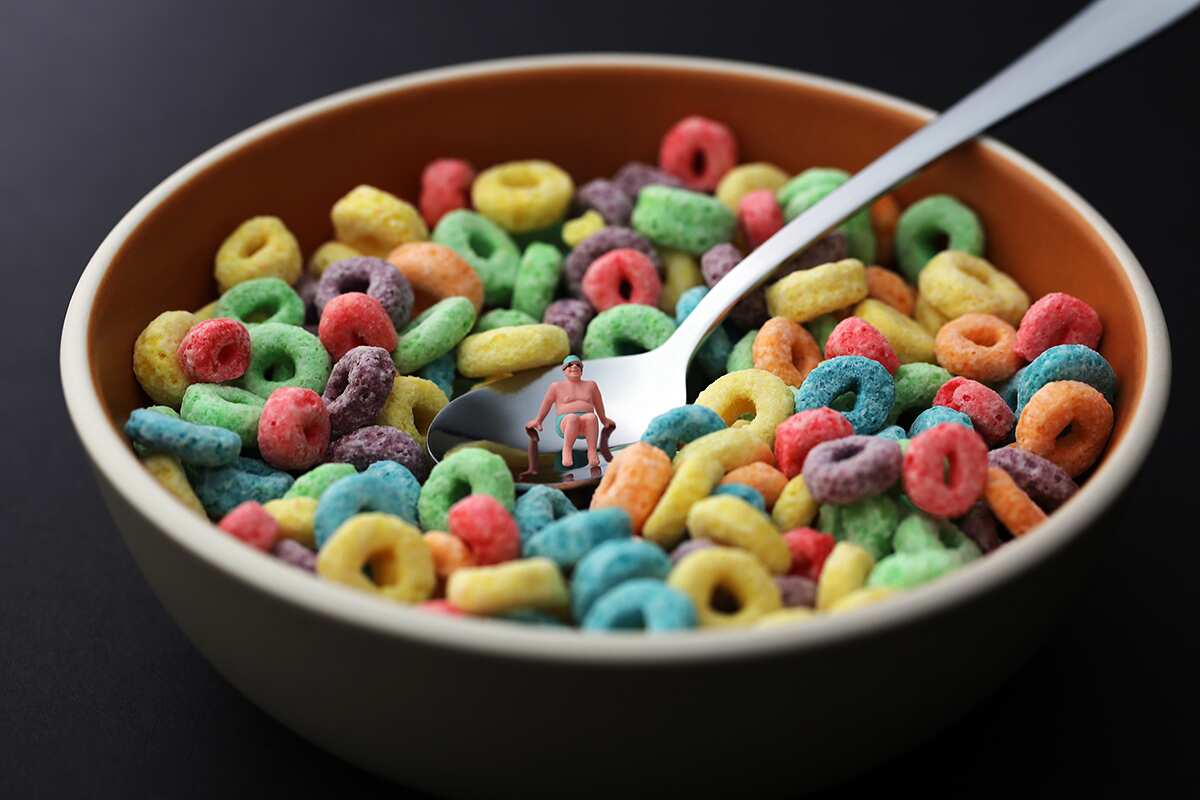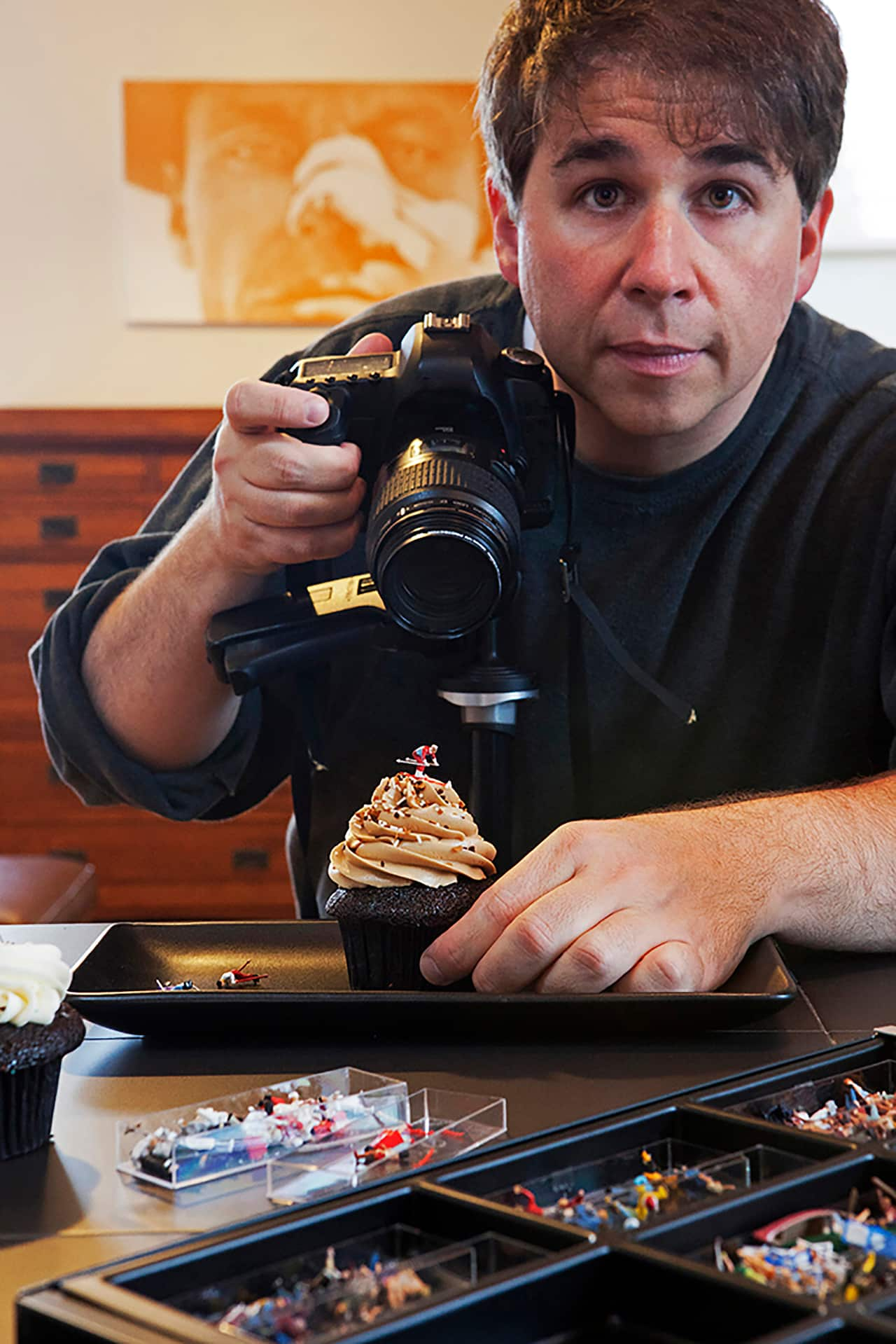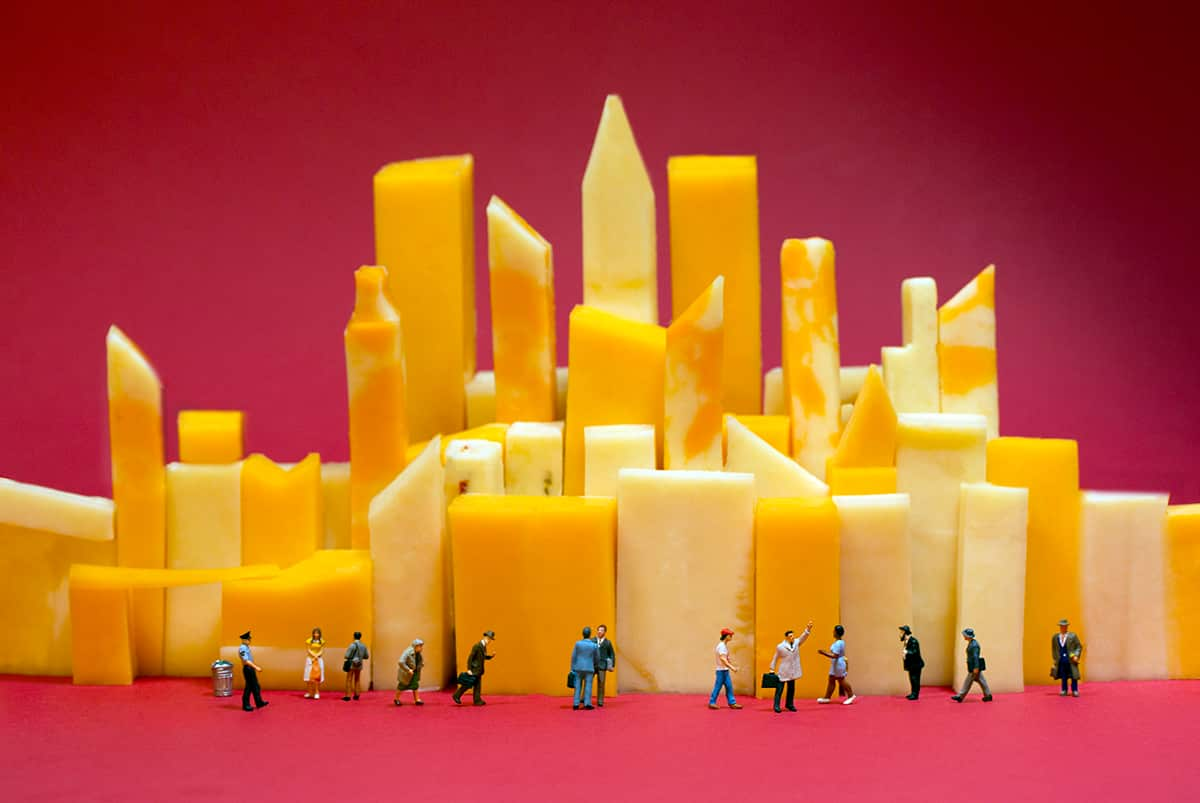Your fine art photographic series Big Appetites – which captures tiny people in seemingly gigantic food environments – has attracted praise from all parts of the globe. One image even graced the cover of Lucky Peach! When you started this project, did you have any idea there would be such a… ahem… big appetite for your work? No. I began the work in 2002 after I was inspired by The Travelers series by Walter Martin and Paloma Munoz, and also an exhibit by the Chapman Brothers — large scale dioramas with tiny figures — that I saw at the Saatchi Gallery in London. I only began making the images because it was something that I was interested in exploring. I never had an intention of publishing them. As such, no one really knew about them for a number of years, except for one of my young nieces who loved them. What drew you to the large food-miniature people concept? Scale juxtaposition is a strong recurring theme in American media. It was everywhere when I was a kid, from cinema to television to advertising mascots. Not to mention the fact that every museum I have ever been in around the world has some tiny artifacts — scale representations of real world objects — that were made thousands of years ago. Mankind is obsessed with miniatures. Some anthropologists seem to think it is a kind of blood memory leftover from our ancestors gathering small nuts and berries in the forest.
What drew you to the large food-miniature people concept? Scale juxtaposition is a strong recurring theme in American media. It was everywhere when I was a kid, from cinema to television to advertising mascots. Not to mention the fact that every museum I have ever been in around the world has some tiny artifacts — scale representations of real world objects — that were made thousands of years ago. Mankind is obsessed with miniatures. Some anthropologists seem to think it is a kind of blood memory leftover from our ancestors gathering small nuts and berries in the forest.

Fruit Loops Sunbather Marvin spent his holiday delighting in the chaos caused by his absence at work. (© christopher boffoli / bigappetites.net) Source: Christopher Boffoli
As a child I was intrigued by miniature things: model building, Matchbox cars, girder and panel sets, and model railroads. I guess I never grew out of the fascination. And I chose food because I thought it offered wonderful color and texture, as well as nearly infinite variety. What I didn’t think about in the beginning was that by working with what essentially are toys and food to create visual art, the images become accessible to just about everyone as these are some of the most common cultural elements across the world.
Mankind is obsessed with miniatures. Some anthropologists seem to think it is a kind of blood memory leftover from our ancestors gathering small nuts and berries in the forest.
Are you a big foodie? I’m an avid cook as well as an enthusiastic eater. In addition to my fine art, commercial and editorial food photography, I’ve also worked as a food journalist (writing about restaurants and chefs). I’m currently producing a documentary film about a James Beard Award-winning chef here in Seattle. So it always seems like I’m doing something with food. Your photographs come with hilariously dark captions contextualising the activities of the figurines. It seems like you have a lot of fun with this! Is this the case? I don’t know if “fun” would be the first word I would use to describe the process of any kind of creative work, but I do appreciate you asking about the captions that accompany my photographs as they are the most frequently overlooked aspect of this work and they’re really intended to be just as essential as the actual images themselves. The captions are really about me trying to infuse a bit more story into the mix. I was an English major at uni and never in a million years thought I would ever make a living as a visual artist. I guess I always feel the need to get some extra words in.
Your photographs come with hilariously dark captions contextualising the activities of the figurines. It seems like you have a lot of fun with this! Is this the case? I don’t know if “fun” would be the first word I would use to describe the process of any kind of creative work, but I do appreciate you asking about the captions that accompany my photographs as they are the most frequently overlooked aspect of this work and they’re really intended to be just as essential as the actual images themselves. The captions are really about me trying to infuse a bit more story into the mix. I was an English major at uni and never in a million years thought I would ever make a living as a visual artist. I guess I always feel the need to get some extra words in.

Christopher Boffoli at work. Source: Christopher Boffoli
Do you have any favourite foods to work with? Not really. It would be easier to catalogue the foods that I dislike working with: ice-cream, liquids, anything that changes its state rapidly at room temperature. The figures I work with are tiny and are not really designed to stand on their own. So cupcakes are easy to work with for the adhesive quality of frosting. It is essential to work with food that is fresh and (if possible) in season as the food needs to look good. We tend to see food at a distance when we’re shopping for it and eating it. And yet we have strong ideas about the way food is supposed to look which doesn’t always reconcile with the imperfections that are revealed by the scrutiny of macro camera lenses.
We tend to see food at a distance when we’re shopping for it and eating it. And yet we have strong ideas about the way food is supposed to look which doesn’t always reconcile with the imperfections that are revealed by the scrutiny of macro camera lenses.
You’re also a photojournalist and have travelled voraciously! Which countries are you particularly drawn to? I tend to be drawn to the countries that are the least Western and in a modern world it can be a challenge to find an authentic experience as you can’t even stand in Tiananmen Square these days without being within sight of a Starbucks Coffee and a KFC. But along those lines, I would have to say that Morocco and especially Burma were two places that really exceeded my expectations.
Tell us about an unforgettable food experience from your travels abroad. Oh there are way too many to choose just one. I’ve enjoyed succulent tagines redolent of spices in Marrakech, spun huge turntables full of spicy Szechuan in Beijing, had hot bread made by bedouins over open fires in the deserts of Jordan, dined by candlelight on duck a l’orange in Saigon, nibbled on fried crickets in the markets of Rangoon, sampled the freshest cuttlefish the Venetian lagoon had to offer, been served still-writhing octopus tentacles in the fish markets of Busan, Korea, had to surrender to never-ending tasting menus at Michelin-starred restaurants in New York, London and Paris. I’ve clearly been very fortunate. Though the greatest meals of my life still remain the Italian food my paternal grandfather would make every Sunday after church when I was growing up. Soul food.
Which food-art bloggers and/or Instagrammers are you into at the moment? I’m fairly busy these days so I don’t have heaps of time for food blogs or Instagram feeds. Though I never miss an issue of Lucky Peach. And I quite like the NY Magazine Grub Street articles that pop up in my Twitter feed.
Though the greatest meals of my life still remain the Italian food my paternal grandfather would make every Sunday after church when I was growing up. Soul food.
What are your top tips to those wanting to enter the photography or art scene? I often do lectures to photography students and they always seem to want to know how to design their career path so they can join me in the upper percentiles of earning money from photography. Maybe there is a plan that would work but I’m not nearly clever enough to know what that would be. My plan was just to have the broad basis of a liberal arts education, to do something I loved, and to be open to doors of opportunities as they opened. I’m hardly the best photographer in the world but sometimes opportunity can breed skill. Photography by Christopher Boffoli (© christopher boffoli / bigappetites.net).
Photography by Christopher Boffoli (© christopher boffoli / bigappetites.net).

Cheese City. Everyone was always scurrying for their own chunk of cheese. (© christopher boffoli / bigappetites.net) Source: Christopher Boffoli
Fringe Foodies Editor Siobhan Hegarty
In our monthly blog, Fringe Foodies, we interview creatives, artists, designers, writers and poets about their affinity with all things edible. From the printed page to sculptures and soundwaves, we discover the myriad ways food can be created, celebrated and consumed.
Share
SBS Food is a 24/7 foodie channel for all Australians, with a focus on simple, authentic and everyday food inspiration from cultures everywhere. NSW stream only. Read more about SBS Food
Have a story or comment? Contact Us

